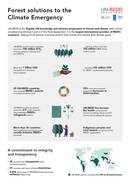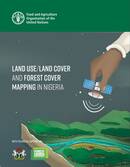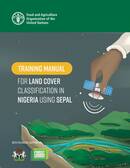Publications
This flyer details the impact of UN-REDD, which is the flagship UN knowledge and advisory programme on forests and climate, with a focus on advancing Articles 5 and 6 of the Paris Agreement. It is the largest international provider of REDD+assistance, helping its 65 partner countries protect their forests and achieve their...
Under the project “Support for the design of the MRV System in the framework of REDD+ Readiness in the Sudan” and with financial support of the Forest Carbon Partnership Facility (FCPF), Food and Agriculture Organization of the United Nations (FAO) has been supporting the Sudan’s Government, particularly the Forests National...
In an effort to reduce emissions from deforestation and forest degradation, the FCPF of the World Bank is supporting the Federal Government of Nigeria to meet REDD+ readiness requirements, and part of the Readiness funds were allocated to develop a national forest reference emissions level for Nigeria. FAO provided technical...
This manual was designed to introduce users to the procedures for navigating SEPAL and Collect Earth Online Software in order to prepare land use/land cover mapping. The illustrations and examples are tailored to mapping Nigeria’s land cover. SEPAL is a free open source package which offers great potential to developing...
Forests are a core nature-based solution, critical to addressing the climate emergency. If deforestation is stopped and degraded forests are restored, they can provide approximately one-third of the carbon reduction needed to avoid the most severe impacts of climate change. The world’s forests also act as shields, keeping humans safe from zoonotic diseases, such as coronaviruses. Their destruction...





